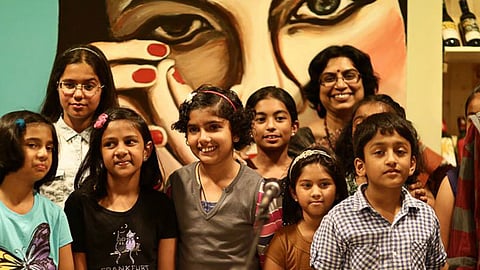

Writing. Thinking. Critiquing. Arguing. Networking. It’s all in a day’s workshop if you’re part of the growing community that is the Bangalore Writers Workshop.
In a world of decreasing attention spans and news in 140 characters, there is decreased appreciation for the written word. More so for punctuation, grammar and spelling.
In literary pursuit, training and guidance is as important as individual interest and talent. But a few colleges and universities in India offer a creative writing course that last from a few weeks to a year.
When Shom Biswas came to India from the US in 2013, he knew he had to do something over the weekends and hit upon the Bangalore Writers Workshop (BWW) in the posh Indiranagar neighbourhood in Bengaluru. Founded in 2011, BWW runs intensive and supportive creative writing workshops for writers in the city.
He took the eight-week BWW Classic course for amateur writers. With every three-hour class over the weekend he liked it better. “At first, it was boring with theory. But as I started taking up assignments, delved deeper, was introduced to the concept of short story, the novel, was taught to characterise and was asked to write pieces, for example, that was completely dialogue, the course started becoming an eye-opener. I could identify the areas that I am good at and ones that I don’t require to focus on,” says Shom, now a part of the finance department in Capegemini, a management consulting company.
Bhumika Anand, director and founder of BWW says that the idea behind starting the workshop was to facilitate creative writing workshops in Bengaluru and build a community of writers in the city who would share critiques with each other and collaborate on creative projects.BWW works on a 5-8 week workshop model. It covers a wide range of writing exercises that allows clients to experiment with different voices and genres. “We place large emphases on being interactive, learning to push boundaries, and group brainstorming. As writers ourselves, we have knowledge on publishing trends, writing for magazines, freelancing, and literary magazines,” Bhumika says.
The workshop organises meet-ups with published authors and literary experts. Book club meetings and discussions around topical events are organised throughout the year. Best of the Bestiary, an anthology of selected work by the earliest BWW batches can also be accessed online. “We organise such activities regularly to help build more connections around writing.
All the authors who visit, naturally inspire, but it’s also very bracing for a writer to hear about the industry and how things function in the publishing world,” says Bhumika. Shashi Deshpande inaugurated BWW. The courses are aimed at exposing writers to as many writing styles and genres as possible even as aspects of their own craft are looked into. “Writing for the masses does not mean weak plots, hackneyed phrases, irresponsible and stereotypical characterisation, appalling grammar and language. It’s a great disservice to think of readers as dumb or lacking discernment,” she says.
On workshop days, the participants discuss texts from the course books, and critique submissions. “It seems ordinary enough, but because it’s writing and literature, there’s no telling where we will head to with any particular discussion. We traverse history, politics, religion, relationships, sexuality, and so on,” quips Bhumika.
Asked if there is a risk of homogenising writing and losing the diverse flavours of writing that each author has to offer, she says, “No single workshop day is alike, but they are all similar in the sense that in each we celebrate good writing, rubbish lazy work, and open ourselves to each other and the world. It’s all very dramatic, even therapeutic at times, and always deeply fulfilling for both the facilitators and the writers. We all teach and learn from each other. Since none of the courses are prescriptive, there is no risk of losing on the diversity of voices or having homogenised work,” she says.
Published BWW authors include Hari Ravikumar, The New Bhagavad-Gita: Timeless Wisdom in the Language of Our Times and Suraj Clark Prasad, Baramulla Bomber. Upcoming authors whose novels will be published this year include Devi Pabreja, Empire and Rahul Mitra, The Boy from Pataliputra.
Works can be seen at https://bangalorewritersworkshop.wordpress.com/category/bww-star/.